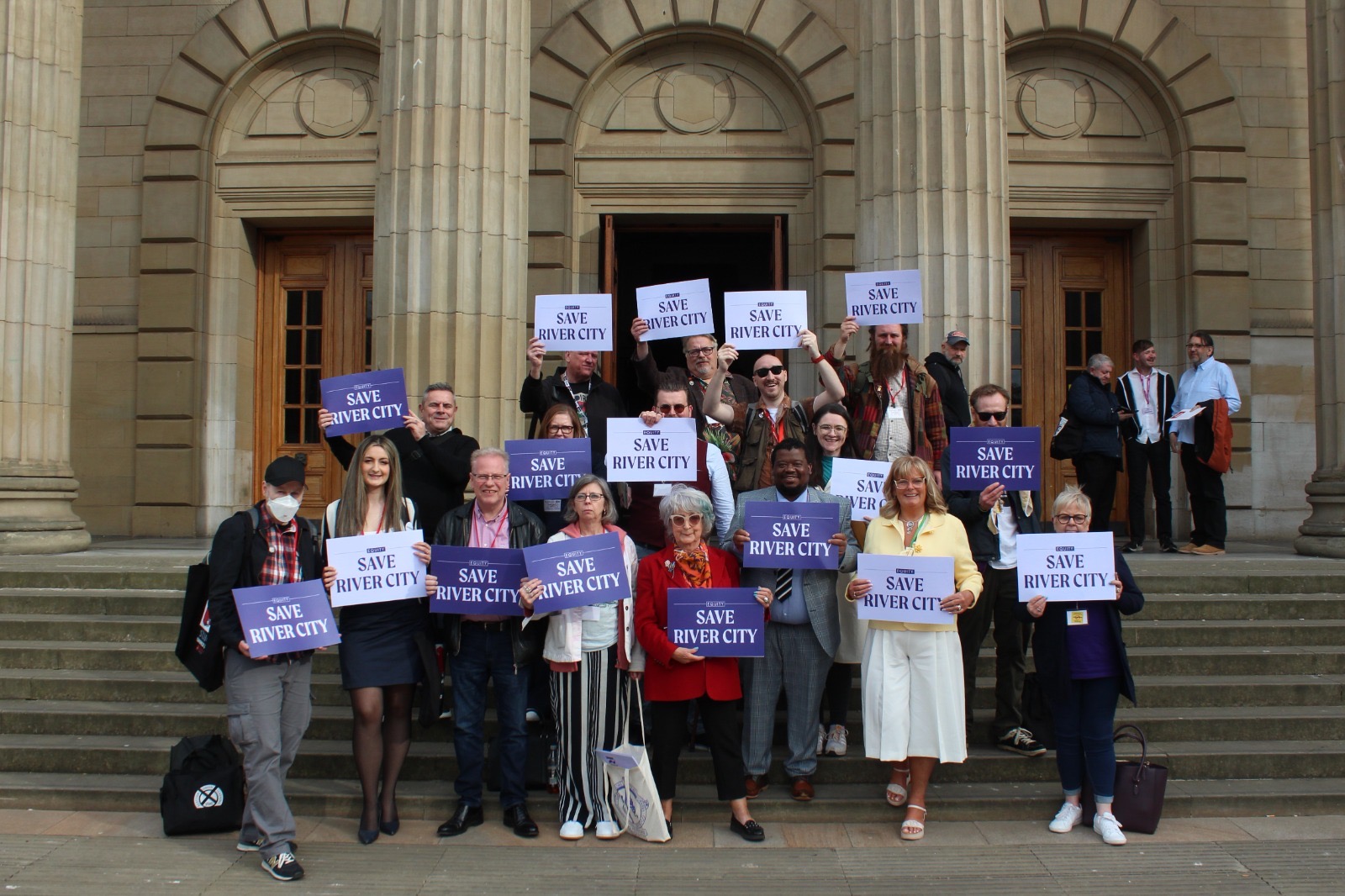The TUC Congress has today unanimously passed Equity’s motion to ban upfront fees charged to performers by casting directories.
The motion noted that while the Conduct of Employment Agencies and Employment Businesses Regulations 2003 prohibits charging upfront fees to work-seekers in most industries, the performing arts and entertainment industries are exempt from this ban.
This has led to a situation in which performers and creative workers pay significant fees, often more than £180 per year, for their inclusion in a casting directory, regardless of whether or not they obtain work.
Equity President Lynda Rooke, who moved the motion, explained that “Spotlight is by far the most dominant casting platform and is now expanding into the lucrative casting market in Europe, subsidised by actors in the UK and the Republic of Ireland who pay double what European actors pay.”
Lynda referenced the High Court action being taken by Equity to challenge the excessive fees and costs put on job seekers in the performing arts industry. “I am one of the members who will give evidence at the High Court to challenge these excessive fees”, Lynda said, drawing applause from the hundreds of assembled delegates representing more than six million trade union members.
Following the passing of the motion, the TUC will now support the repeal of this unfair exemption for the performing arts and entertainment industries and call for such casting directory fees to be borne by producers, not workers; and the TUC will lobby the government to bring forward legislation to remove the exemption.
The motion was seconded by the National Education Union, with speaker Sheila Kavanagh condemning the “unacceptable” fees charged by recruiters and pointing to abuses which are exacerbating recruitment problems in schools. While especially acute within performing arts, it’s clear that the rip off practices of recruitment firms hit a nerve across Congress, with the unanimous backing of delegates showing that the whole trade union movement supports Equity’s campaign. You can find out more about our policy, legal action, and approach regarding Spotlight here.
We will continue our campaign until there is a total ban on upfront fees charged to performers by casting directories.
“Choosing resistance”
— Equity (@EquityUK) September 11, 2024
As #TUC24 comes to a close, thank you to our fellow trade unions for their solidarity.
To sign off, here’s our President @LyndaRooke moving a motion to ban upfront fees charged to performers by casting directories, which now has the backing of @The_TUC 💪 pic.twitter.com/a9gPIMDPyQ
Equity members resilience to paying for work-seeking is over, they’ve had enough, they are choosing resistance instead – in the courts, in their workplaces, and within our wider movement.
Lynda Rooke, Equity President
Equity’s motion in full
Motion 04 Ban upfront fees charged to performers by casting directories
Congress:
i. notes that, while the Conduct of Employment Agencies and Employment Businesses Regulations 2003 prohibits charging upfront fees to work-seekers in most industries, the performing arts and entertainment industries are exempt from this ban:
ii. recognises that performers and creative workers – and not engagers, casting directors or agents – pay significant fees, often in excess of £180 per year, for their inclusion in a casting directory, regardless of whether or not they obtain work; and
iii. notes that, during a cost-of-living crisis, this cost places a significant burden on workers in an industry already characterised by insecure work and unpredictable income.
Congress calls, therefore, on the TUC to:
a. support the repeal of this unfair exemption for the performing arts and entertainment industries and call for such casting directory fees to be borne by producers, not workers
b. lobby the government to bring forward legislation to remove the exemption.
Equity
Lynda Rooke’s speech in full
Congress, when I first started acting back in the previous century, I joined Equity and I also paid to have my photo and profile in Spotlight, which is a casting directory that at the time was in hard copy and was for many years a family run business.
But in 2021 the company was bought out by Talent Systems LLC and is now owned by a number of US based private equity firms.
They claim that they are, “Powering the Global casting software ecosystem”. That means making money out of actors looking for work, and what our 50,000 members in Equity witness is a consolidation of power and control over their access to these job seeking resources.
The directories are now online, where performers upload personal information to a profile, casting directors post work opportunities, and the platform shows the performer opportunities matching their profile. To preserve this longstanding practice, casting directories enjoy a specific legal exemption, it allows them to charge a fee to performers for their inclusion in the directory or platform.
Spotlight is by far the most dominant casting platform and is now expanding into the lucrative casting market in Europe, subsidised by actors in the UK and the Republic of Ireland who pay double what European actors pay.
In the aftermath of the pandemic, with a cost of living crisis, a vast number of our members, are struggling to keep a roof over their head, pay household bills, or cover childcare, all this in what is already a very precarious industry. This year the cost to be in the Spotlight directory is £198, a 9% increase on last year. Everybody pays the same to be in this directory whether their net annual earnings are less than £15,000 or they are high end earners and 95% of acting jobs are cast through this directory. Remarkably unlike many other sectors, the employers do not pay to find their workforce. That cost is borne by our members, this is totally an unjust cost for a working actor.
Why does this matter? Because the stories that are told on our stages and screens, where they are told, and who gets to tell them is a critical part of the struggle of our class. Up-front fees disproportionately hinder artists from working class backgrounds and, especially in our precarious industry, they hit those who work the least, the hardest. That’s Black workers, Disabled artists, trans people, and women – especially older women. Equity sees no reason why our members should be treated differently from workers in any other industry when it comes to up-front fees.
The scenario I’ve described is outlawed for most working people since 1973 – but the Regulations which cover work seeking explicitly exempt the performing arts and entertainment industries. The desire to work that we know our Equity members have, has an up-front cost – it’s a tax on hope.
Can I stress that this is widely and deeply felt by our members, and as a consequence our union policy changed at the end of 2023. Part of the reason Equity previously took no issue with Spotlight is that we had the reassurance of particular legal restrictions on its fees. While casting directories can charge an upfront fee, the fee must represent no more than the costs of production and circulation of the directory.
Besides our political campaign to end up-front fees entirely, we also believe Spotlight’s fees exceed this restriction. In response to our request for an explanation of how its fees are calculated, Spotlight denied that the regulations apply to it at all. We are therefore asking the High Court to order Spotlight to show how it calculates its fees with reference to the legislation. I am one of the members who will give evidence at the High Court to challenge these excessive fees. Equity members resilience to paying for work-seeking is over, they’ve had enough, they are choosing resistance instead – in the courts, in their workplaces, and within our wider movement.
We believe our legal challenge will succeed in lowering the exorbitant fees for performers, but it will not do away with upfront fees entirely. For that, we continue to work with the new government to put our case as strongly as possible that this unfair carve-out must end. We look to you the TUC’s 48 affiliates to back this motion and end the tax on hope.
In solidarity




